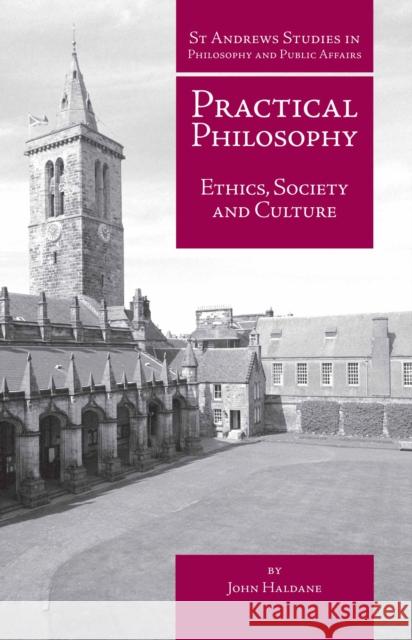Practical Philosophy: Ethics, Society and Culture » książka
Practical Philosophy: Ethics, Society and Culture
ISBN-13: 9781845401818 / Angielski / Twarda / 2009 / 400 str.
Practical Philosophy: Ethics, Society and Culture
ISBN-13: 9781845401818 / Angielski / Twarda / 2009 / 400 str.
(netto: 232,96 VAT: 5%)
Najniższa cena z 30 dni: 237,55 zł
ok. 30 dni roboczych.
Darmowa dostawa!
In this wide ranging volume of philosophical essays John Haldane explores some central areas of social life and issues of intense academic and public debate. These include the question of ethical relativism, fundamental issues in bioethics, the nature of individuals in relation to society, the common good, public judgement of prominent individuals, the nature and aims of education, cultural theory and the relation of philosophy to art and architecture. John Haldane is Professor of Philosophy, and Director of the Centre for Ethics, Philosophy and Public Affairs in the University of St Andrews. He is also a former Royden Davis Professor of Humanities at Georgetown University and is currently a Senior Fellow of the Witherspoon Institute, Princeton. As well as being a prominent academic philosopher he is well known in Britain, in North America and elsewhere in the English-speaking world as a public intellectual and social commentator. 'In Practical Philosophy, John Haldane eloquently makes the case for an approach to ethics that is distinctively practical thought with a view to action (as contrasted with theoretical thought that might possibly be applied to the domain of action). Taking his inspiration from a tradition that includes Aristotle, Aquinas, and Elizabeth Anscombe, Haldane argues that an orthodox dichotomy has long dominated both philosophical and everyday thinking: we must be either dualists or material reductionists. Both of these alternatives, however, neglect a subtle approach to intentionality and agency offered by the Aristotelian tradition. Haldane uses his illuminating approach to advance arguments on a number of controversial moral and political issues: the status of the foetus, the importance of the family, compensation for victims of crime, the basis of human solidarity across national boundaries. Although his conclusions are frequently controversial, Haldane always avoids polemics and the ideological parti pris, thus giving a welcome example of respectful and civil public argument.' Martha Nussbaum 'What resources can philosophy bring to bear, when its enquiries are not theoretical, but practical? In Practical Philosophy John Haldane answers this question in a brilliant survey of key issues, showing us how a variety of theories can obscure or distort our view of the practical realities of life, family, and society. With admirable clarity he also shows us how philosophy can rescue us from such theorizing.' Alasdair MacIntyre"











